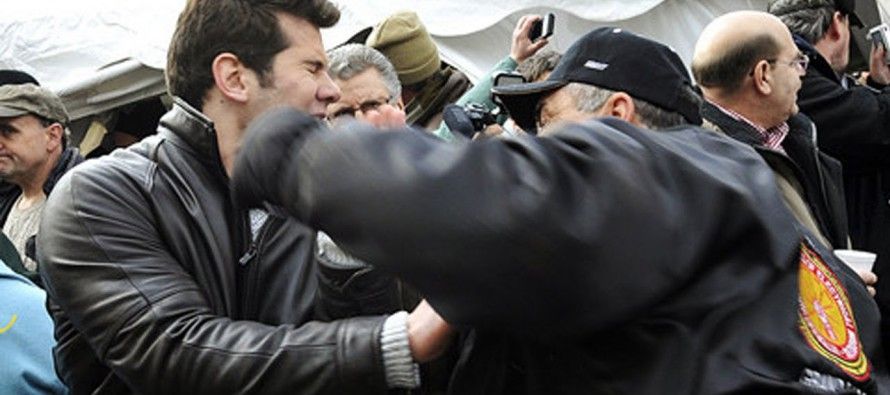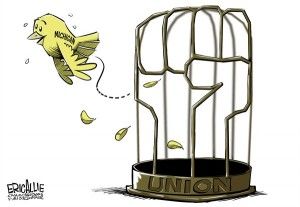Audacity! Mich. shows Calif. GOP how to revive party

By John Seiler
When I was growing up in Michigan in the 1960s, the Democratic Party mostly dominated the state. Kennedy, Johnson and Humphrey won the presidential contests. Democrats controlled the Legislature. And labor unions dominated the Democratic Party. Much like in California today.
One difference was that Michigan’s governors were Republicans, but they were liberal Republicans in the Schwarzenegger mold. In particular, Gov. George Romney, Mitt’s father, imposed the first state income tax and more than doubled the state budget in just six years in office. He was a Democrat in all but name.
But in the 2010s, Michigan’s Republican Party is resurgent — and offers lessons to California’s down-and-out GOP. L.A. Times columnist George Skelton and many others have suggested that the CA GOP would do better if it just became a lot more like the California Democratic Party.
The Michigan experience suggests the opposite. Two years ago, the state was a mess after eight years of Democratic Gov. Jennifer Granholm, Canadian born but raised from childhood in California’s Bay Area. Like Schwarzenegger, she also had a career in Hollylwood acting, although hers was brief. She now is teaching at U.C. Berkeley, so California taxpayers are paying for her pay, perks and pension as she teaches impressionable young minds how to misgovern.
Instead of trying to imitate Granholm and other Michigan Democrats, Michigan Republicans did the opposite: They strongly backed major budget reforms and tax cuts. They were rewarded with victory. The party now has large majorities in both houses of the Michigan Legislature. And Rick Synder is the popular, and mostly conservative, governor.
This has occurred even though the state remains mainly Democratic and voted for Barack Obama for president. The last time Michigan backed a Republican for the Oval Office was way back in 1988, the same as California.
A big reason for Republican success is that voters trust them to deal with the state’s financial messes, including effectively bankrupt Detroit. It’s not exactly clear what will happen, but actually dissolving the Motor City is one option.
In a similar fashion, former Mayor Richard Riordan has warned that Los Angeles is headed for bankruptcy.
Taking on the unions
A key part of the Republican resurgence in Michigan is taking on the unions. The Great Lake State was the cradle of the union movement a century ago. But now it has become a liability, with unions impeding reforms — the same as in California.
In the November election, the unions placed on the ballot Proposal 2, called by the unions the “Save Our Jobs” initiative. It would have given unions almost total authority over the state. Critics charged that it even would have protected unionized public-school teachers that were drunk or dealing drugs in the classroom. (That’s close to how California’s unions succeeded in defeating in our Legislature SB 1530, by state Sen. Alex Padilla, D-Los Angeles. It would have made it easier to get rid of teachers that use sex, drugs or violence against students.)
For Michigan’s union-backed Proposal 2, according to Ballotpedia, the unions massively outspent opponents by 22-to-1.
But Proposal 2 lost anyway, 57 percent to 43 percent.
Aggressive GOP
In the past, Republicans would have sighed in relief and gone back to their country clubs. (That’s certainly what Republicans did in California in the mid-1990s during their brief period of ascendance in the state Legislature.)
Not this time. As you may have heard, the Michigan Legislature just passed right-to-work laws, which Snyder signed into law. Payback time.
The reforms guarantee workers the right to join a union — or not join a union. The unions have boiled over with hatred. For them, “freedom” means forcing others to join their union. Here’s a typical response (note: bad language in the YouTube):
But here’s what it really means. An old journalistic comrade of mine, Patrick McGuigan of Oklahoma, described what happened when his state passed similar legislation:
“Congratulations, Michigan.
“In 2001, after decades of debate and a multi-million dollar campaign, voters in Oklahoma approved a ballot question enshrining the right to work in the state Constitution.
“Today, Oklahoma City has the lowest unemployment rate of any large American city. The state has outperformed much of the nation even during the depths of the Great Recession, and is projected to become one of the top states for job creation in the first quarter of 2013. Per capita personal income growth is outpacing the nation.
“Ultimately, the same results will come to Michigan.
“Monday, President Obama said the fight over Michigan’s right-to-work proposal is about politics and ideology, not economics.
“Politics is indeed part of the equation in any major policy shift in any American state — and that was certainly the case in Oklahoma in 2001, and in Indiana last year.
“But in the end, the proof is in the pudding: Oklahoma is evolving from its longstanding status as a poor, bottom-tier state into a steadily growing economy with a bright future — and that’s all about economics. Still, the strongest arguments for right to work are moral, rooted in rights of voluntary association and personal liberty.”
Audacity!
California desperately needs political competition. A one-party state never turns out well, whether in California or Cuba.
If Republicans want to get back in the ring and compete in California, the wrong strategy would be to mirror the Democrats.
Instead, they should look to the feisty Michigan GOP. They should take direct aim at the powerful unions. Make it a David vs. Goliath contest.
For starters, how about a right-to-work initiative on the ballot in 2014? Make sure it’s not a compromised initiative, like Proposition 32 was this year. The California unions ran ads attacking the loopholes for “special interests.”
Instead, get the ballot language from Oklahoma’s initiative, Question 695, which now is Section 23, Article 1A of the Oklahoma Constitution (text below). Make the new initiative about the unions themselves. Make it about union power. Because then the very exercise of that power — spending tens of millions of dollars in attack ads — itself is turned against the unions.
And every Republican in the state should make the right-to-work initiative the center of his campaign. No Democrat would dare buck the unions and back it. So it would be a clear contrast.
That also would help win Latino voters to the GOP. Because even many Democrats, such as former state Sen. Gloria Romero, are sick of how the the teachers’ unions care less about Latino students’ poor performance than about maintaining spiked pensions for teachers who aren’t even teaching any more.
When California state finances fall off a cliff, as they soon will, voters will look for the culprits. And as in Michigan, those culprits will be obvious: The Democratic Party and its union string-pullers.
For California Republicans, the key to victory is the same as when Danton exclaimed to the French Assembly in 1792: “Audacity! Audacity! Always audacity!”
————————
Here’s the language of Article 23, Section 1A of the Oklahoma Constitution:
SECTION XXIII-1A.
Right to work.
A. As used in this section, “labor organization” means any organization of any kind, or agency or employee representation committee or union, that exists for the purpose, in whole or in part, of dealing with employers concerning wages, rates of pay, hours of work, other conditions of employment, or other forms of compensation.
B. No person shall be required, as a condition of employment or continuation of employment, to:
1. Resign or refrain from voluntary membership in, voluntary affiliation with, or voluntary financial support of a labor organization;
2. Become or remain a member of a labor organization;
3. Pay any dues, fees, assessments, or other charges of any kind or amount to a labor organization;
4. Pay to any charity or other third party, in lieu of such payments, any amount equivalent to or pro rata portion of dues, fees, assessments, or other charges regularly required of members of a labor organization; or
5. Be recommended, approved, referred, or cleared by or through a labor organization.
C. It shall be unlawful to deduct from the wages, earnings, or compensation of an employee any union dues, fees, assessments, or other charges to be held for, transferred to, or paid over to a labor organization unless the employee has first authorized such deduction.
D. The provisions of this section shall apply to all employment contracts entered into after the effective date of this section and shall apply to any renewal or extension of any existing contract.
E. Any person who directly or indirectly violates any provision of this section shall be guilty of a misdemeanor.
Added by State Question No. 695, Legislative Referendum No. 322, adopted at Special Election held on Sept. 25, 2001.
Related Articles
There are no Henry Cuellars among CA’s Democratic pols
Jan. 29, 2013 By Chris Reed As a libertarian believer in free minds and free markets, I’ve watched for decades
Boo-Hoo: Perez Upset At Pay Loss
John Seiler: Assembly Speaker John Perez, D-Los Angeles, finally knows what it feels like to be the victim of his
Expect More Population Flight
NOV. 2, 2010 By WAYNE LUSVARDI Given the predictably one-sided recent election results in California, a new trend may be



